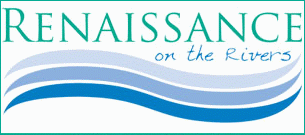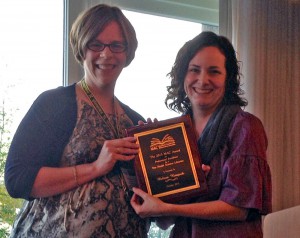The HSLS Staff News section includes recent HSLS presentations, publications, staff changes, staff promotions, degrees earned, etc.
News
Pat Weiss, reference and information technology librarian, was appointed faculty representative to the University of Pittsburgh Board of Trustees’ Property and Facilities Committee for 2013-14.
Publications
Jonathon Erlen, history of medicine librarian, along with co-author Jay Toth, published “American Indian Dissertation Abstracts,” in Indigenous Policy Journal 24, no. 2 (2013).
Presentations
Renae Barger, executive director, NN/LM Middle Atlantic Region, and Kate Flewelling, outreach coordinator, NN/LM Middle Atlantic Region, presented a lecture, “Partners in Information Access for the Public Health Workforce: A Resource for Evidence-based Practice,” on October 16, 2013, at the Pennsylvania Public Health Association and Pennsylvania Office of Rural Health Annual Conference, in Harrisburg, PA.
Michelle Burda, network and advocacy coordinator, NN/LM Middle Atlantic Region, presented two lectures, “Meeting the Challenge of Change,” on October 14, 2013, at the MLA Mid-Atlantic Chapter Annual Meeting, in Pittsburgh, PA, and “Health Literacy: Its Importance to You and Healthcare Professionals,” on October 17, 2013, at the Upstate New York and Ontario Chapter MLA, in Fairport, NY.
Lydia Collins, consumer health coordinator, NN/LM Middle Atlantic Region, presented several lectures, “Supporting a Healthy Community,” on October 22, 2013, at the Pennsylvania Library Association Annual Conference, in Seven Springs, PA; “Introduction to the National Library of Medicine’s Toy Box,” on October 15, 2013, and “National Library of Medicine: Environmental Health and Genetics Resources at Your Fingertips,” on October 16, 2013, at the New Jersey Science Convention, in Princeton, NJ; “MedlinePlus and Affordable Care Act Resources for Delaware,” on October 3, 2013, at the Delaware Division of Libraries, Dover Public Library, in Dover, DE; and “MedlinePlus and Affordable Care Act Resources for Pennsylvania,” on October 1, 2013, at the Delaware County Library System, in Media, PA.
Charlie Wessel, head of research and reference initiatives, provided a systematic review update to National Institutes of Health informationists and librarians on September 25, 2013, at the NIH Library, Bethesda MD.



